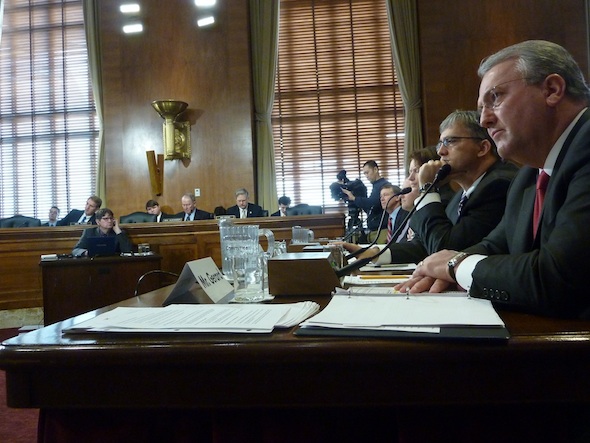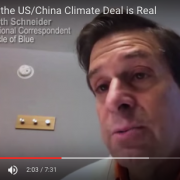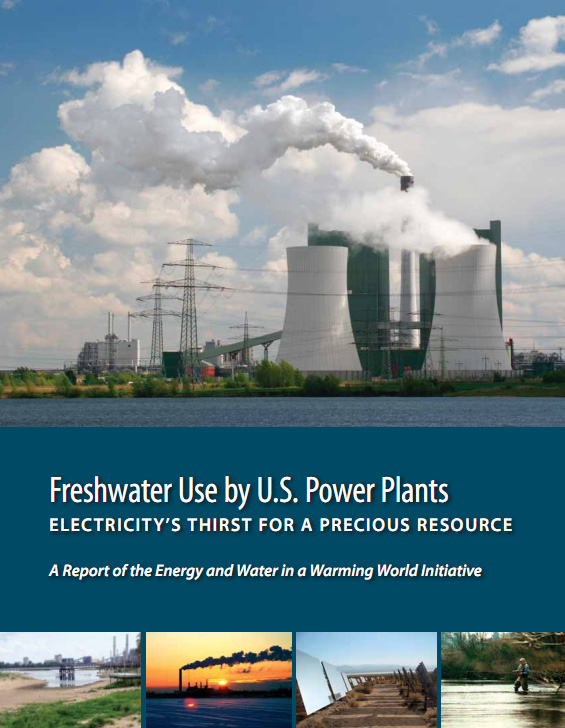Washington Water Main, February 22: Natural Gas and Climate Change Take Center Stage
A Senate committee hosts arguments on the federal government’s role in the U.S. natural gas boom, while Senate Democrats this week released a climate bill that could be the first in years to reach the Senate floor.

Natural Gas Policy
The search is on for a so-called ‘sweet spot’ in federal regulations of natural gas, and water issues lurked beneath the surface. The booming industry is still relatively new in the United States, so major questions remain unanswered:
- What federal environmental regulations, if any, should apply to hydraulic fracturing operations?
- How much domestically produced natural gas should be sold overseas?
- How free should international gas trading markets be?
The dividing lines were clear in a Senate Energy and Natural Resources Committee hearing on February 12. Republicans and right-leaning organizations believe that state-level regulation is sufficient, natural gas exports should grow, and gas-trading markets should be as open as possible. Democrats and their allies believe in more targeted federal regulation and careful consideration — likely resulting in federal involvement — in gas exports and trading.
Senator Ron Wyden (D-Oregon), the committee’s chairman, mentioned concerns of groundwater contamination in his opening statement. Though pollution was folded into talk of environmental regulations, missing was any talk of hydraulic fracturing’s great demand for water, which states like Texas are starting to pay attention to.
Despite their differences, the senators and witnesses were respectful and reflective throughout the hearing.
Wyden set the tone early, noting that he wanted to hear from witnesses about a “sweet spot” at which U.S. gas producers are profitable, manufacturers’ supplies are stable, and the environment “actually benefits from greater use of natural gas and lower CO2 emissions.”
Bridging both camps in the debate was Andrew Liveris, chief executive of Dow Chemical. His company, he pointed out, buys more gas than most countries, so he has a major stake in the debate.
–Frances Beinecke
Natural Resources Defense Council
Liveris argued that legislators should take more time for research and debate before drafting regulatory policies. In his mind, he said, a “quadruple win” was possible for the United States: low energy costs for individuals, stable manufacturer’s prices, export expansion for producers’ benefit, and overall economic growth.
The strongest advocate for regulation was Frances Beinecke, president of the Natural Resources Defense Council.
“Now shale gas production is expanding with supersonic speed without having in place even the basic environmental and public health requirements that apply to other industries,” Beinecke said in her prepared statement.
Adding a politician’s touch to the push for federal regulation was Governor John Hickenlooper (D-Colorado), who called for stricter oversight. Senator Lisa Murkowski (R-Alaska), the committee’s ranking Republican, pressed Hickenlooper on how more federal oversight could possibly be beneficial.
“Different states and the federal government can cut red tape, but maintain a high set of regulatory environmental standards,” Hickenlooper said.
Among the witnesses vocally opposed to any federal restrictions – whether for environmental protection or export limitations – was Ross Eisenberg, vice president at the National Association of Manufacturers.
“There is no easier way to limit the job-creating potential of natural gas to manufacturers than to lump so many costly, time-consuming regulations onto the drilling process that the gas never gets out of the ground,” Eisenberg said.
The senators and witnesses left the hearing no closer to federal action than when they arrived. The next step, committee spokesman Keith Chu told Circle of Blue, was to wait for the Department of Energy, which is reviewing 16 proposals for natural gas terminals and pipelines.
Senate Democrats Propose Climate Bill
The Senate Environment and Public Works Committee’s agenda is set for the upcoming year. The latest addition: A comprehensive climate bill.
Committee Chairwoman Barbara Boxer (D-California) said in a news conference on Thursday that she and her colleagues would move the Climate Protection Act to the floor by the summer, after they pass the Water Resources Development Act, which guides water-related infrastructure development in the United States, primarily by the Army Corps of Engineers. Should the Climate Protection Act reach the Senate floor, The Hill reported, it would be the first major climate legislation to do so in four years.
A carbon-emissions price is the central feature of Sanders’ climate bill, an element that acts on President Barack Obama’s call for a market-based way to address climate change in his State of the Union address last week.
The carbon fee is also the bill’s most obviously controversial element. It will likely not pass in the Senate, The Hill reported, let alone the House. Some more conservative Democrats are joining Republicans in opposing a price on carbon, fearing it would boost energy prices and harm an already unstable economy.
–Ross Eisenberg
National Association of Manufacturers
“It’s not just energy prices that would skyrocket from a carbon tax — the cost of nearly everything built in America would go up. Let’s not lose sight of how big of a dud cap-and-trade was in 2009, or as it came to be known, cap-and-tax. This is really no different,” said Senator David Vitter (R-Louisiana), the top Republican on the Environment and Public Works Committee, in a statement Thursday.
Senator Bernie Sanders (I-Vermont) – the bill’s sponsor – said in the news conference that the bill will try to offset spikes in energy costs for consumers. He also emphasized that, while Obama will likely lead action on climate change in the next two years, only Congress can lead a strong national response to climate change with legislation.
If Sanders’ proposed carbon fee were adopted, it would generate $US 1.2 billion from the 2,900 largest carbon polluters in the United States by 2021, according to the Congressional Budget Office. Sanders said 60 percent of that revenue would subsidize the higher bills of U.S. energy users. The rest would be invested in job-training programs and research and development related to renewable energy and energy efficiency, as well as debt reduction, GHG News reported.
A group of prominent climate activists joined Boxer and Sanders for the announcement, including 350.org’s founder Bill McKibben and the Sierra Club’s executive director Mike Brune, both of whom were arrested last week during a demonstration at the White House.
Sources: Congressional Budget Office; GHG News; The Hill; Office of Senator Bernie Sanders; Senate Committee on Energy and Natural Resources; StateImpact Texas
is a Washington, D.C–based correspondent for Circle of Blue. He graduated from DePauw University as a Media Fellow with a B.A. in Conflict Studies. He co-writes The Stream, a daily summary of global water news.








Leave a Reply
Want to join the discussion?Feel free to contribute!